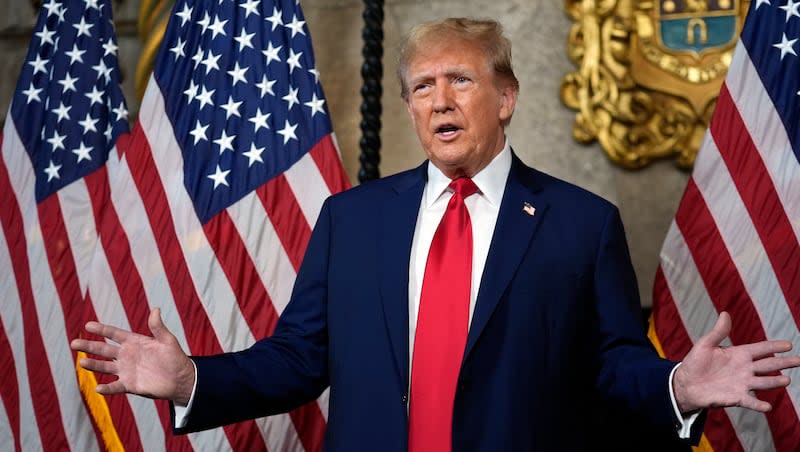What the Supreme Court said about former President Donald Trump’s presidential immunity claim

- Oops!Something went wrong.Please try again later.
The Supreme Court on Thursday heard a case that could change the course of the 2024 presidential election and American democracy more broadly.
The key question? Whether — and to what extent — a president’s official actions are immune from criminal prosecution.
Case background
The case stems from the chaotic aftermath of the 2020 presidential election.
Former President Donald Trump has been charged with unlawfully interfering with the certification of that election and creating the circumstances under which the Jan. 6, 2021, attack on the U.S. Capitol could arise.
The former president’s team argues that he was not unlawfully interfering with the election, but was actually working to protect its integrity. But more importantly for the purposes of the Supreme Court case, they say Trump should be immune from prosecution, since the moves he made were official acts.
Federal district and circuit courts ruled against Trump, determining that Special Counsel Jack Smith’s case against him could proceed.
But in late February, the Supreme Court agreed to take up the question of presidential immunity.
Takeaways from oral arguments
D. John Sauer, who argued on behalf of Trump, told the Supreme Court Thursday that broad presidential immunity ensures that leaders can be bold and fearless during their time in office.
If the threat of criminal prosecution loomed over them, they’d be less effective leaders, he said.
Several justices pushed back on Sauer’s presentation, presenting hypotheticals in which a president masked personal misconduct with an official act.
For example, Chief Justice John Roberts asked whether you could prosecute a president for accepting a bribe from someone who was then appointed as an ambassador.
Sauer said that such a criminal proceeding would need to separate personal actions from official ones and then focus only on the personal moves. He, along with some of the justices, appeared to want the Supreme Court to send the case back to the lower courts for that sort of assessment.
But several justices were dissatisfied with the idea that official acts should always be covered by presidential immunity protections.
Justice Ketanji Brown Jackson suggested that, if that were the case, there would be a significant risk of presidents committing crimes with abandon.
“I think if someone with those kinds of powers, the most powerful person in the world, with the greatest amount of authority, could go into office knowing there would be no potential penalty for committing a crime ... what’s the disincentive from turning the Oval Office into a seat of criminal activity?” she said.
Similarly, Justice Elena Kagan said that if those who wrote the Constitution wanted the president to be mostly immune from criminal prosecution, they would have said that in the Constitution.
“The Framers did not put an immunity clause into the Constitution. They knew how to,” she said. “They were reacting against a monarch who claimed to be above the law. Wasn’t the whole point that the president was not supposed to be above the law?”
But many of the court’s more conservative justices appeared to be at least a little concerned about how a ruling saying that presidents are never or almost never immune from criminal prosecution would affect future leaders.
“I’m very concerned about the future,” said Justice Brett Kavanaugh. “It’s not going to stop. It’s going to ... be used against the current president and the next president and the next president after that.”
He and others pressed Michael Dreeben, who argued in favor of allowing the criminal case against Trump to proceed, to outline his vision of president immunity and questioned whether it was too narrow.
Dreeben argued that there are checks and balances in place to ensure that the Justice Department and people like Special Counsel Jack Smith act on behalf of the American people instead of using the system to settle personal scores.
How will the Supreme Court rule on Trump’s immunity claim?
The Supreme Court’s eventual ruling in the case will hold significant consequences for the 2024 presidential election.
If the justices reject Trump’s immunity claim and say the criminal case can proceed, then he’ll have to juggle campaigning with fighting the special counsel’s charges.
If the justices say that the district court should reconsider the immunity claim and sort out personal actions from official ones, then the case would be delayed and potentially be less top of mind for voters this fall.
If the justices side with Trump’s team and accept the idea of broad presidential immunity, they would be removing one of the major obstacles standing in the way of the former president’s reelection effort.
The court’s decision will also affect President Joe Biden and future presidents, since it will clarify the scope of presidential immunity.
The Supreme Court’s ruling is expected by the end of June.

